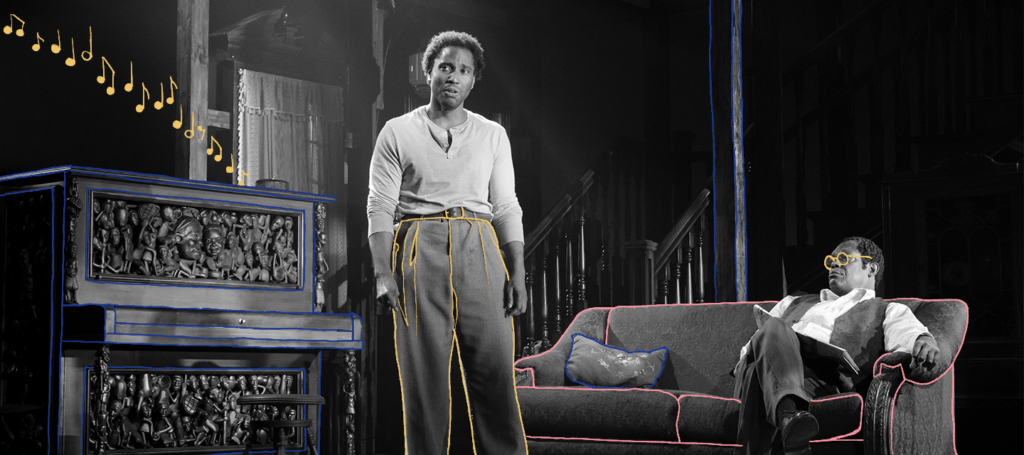


This “Piano Lesson” Hammers the Obvious Note Over Its Head
The best horror films understand that what is left unseen is more powerful than anything that could ever appear on-screen. And though August Wilson’s Pulitzer Prize-winning play, The Piano Lesson is no horror flick, when staged well, its treasure trove of invisible forces and tensions leaves even the most stoic audiences alternating between pathos, humor, anger, and fright.
In her Broadway directorial debut, rather than navigate between the subtleties of those feelings, LaTanya Richardson Jackson latches onto one of The Piano Lesson’s more obvious themes―that a house divided cannot stand.
Highlighting the strife between characters who are already at odds with each other might seem like the natural choice. After all, sophisticated turmoil is already built into Wilson’s gorgeously lyrical text.
There are confrontations between a younger generation and the surviving siblings of their progenitors; the clash between genders and hypocritical sex-based morales; a fight between those who took advantage of the Great Migration and those who stayed behind; and threats of deadly fisticuffs between siblings.
Rancor between various parties forms the subtext of this masterpiece. But by hammering it repeatedly over the head, Jackson reduces this piano lesson into a comedic sitcom that traps its actors within one-note characterizations. Worse, it reveals that she does not trust the audience to connect the dots for themselves.
The action of The Piano Lesson revolves around two siblings, Boy Willie (John David Washington) and Berniece (Danielle Brooks) who are at odds with each other over what to do with a family heirloom—a piano that their grandfather transformed into a tribute to their ancestors. Years ago, their grandfather, a slave, carved the faces of their relatives into this piano to appease his owner’s wife. Seventeen years before the play begins, Berniece and Boy Willie’s father is killed after he reclaims their birthright from the family’s former owners―the Sutters.
Now, the family is haunted by the ghost of one of their ancestral antagonists who wants to steal the piano back for himself, even as Berniece and Boy Willie bicker over what to do with their inherited trauma. Berniece wants to hold onto the piano even though she refuses to play it. Boy Willie wants to sell it in order to purchase the land that their family once watered with their blood. These themes―the cost of one’s inheritance; what it does to one and what one does with it―are all but neglected under Jackson’s direction.
In place of that investigation, we see Washington’s Boy Willie harass his friends and family members at one volume for three hours without nuance or new tactics, while Brooks’ Berniece waffles between playing a chaste boss babe and a romantic lead. Like Jackson’s direction, the two play-siblings leave nothing to the imagination. The pay-off is a parlor room comedy that implodes beneath the weight of Wilson’ glorious language.
This lack of imagination extends to Beowulf Boritt’s set design, a broken skeletal frame that comes together during a pivotal moment to show that the family is finally reunited. But most egregious of all is Jeff Sugg’s clumsy projection which shows Sutter’s ghost during a poorly staged confrontation with Boy Willie. In most productions of The Piano Lesson, this conflict occurs offstage, with Sutter’s ghost attempting to kill Boy Willie, and Berniece finally overcoming her grief to play the piano and release everyone from their trauma.
Without that course of action, we see two siblings who have been on the verge of murdering each other, suddenly embrace over an unearned reconciliation. The tonal discordance is shockingly deflating, to say the least.
What remains from this revival are masterful performances by April Matthis, whose Grace understands how to navigate between what she wants and what is projected onto her, Ray Fisher’s hilariously sweet, though not too bright, Lymon, and Michael Pott’s caught up in his sour regrets Wining Boy. One wonders what this play might have accomplished if they’d been cast as the central siblings instead. Or if someone with a better handle on the material had been charged with leading the helm.
If you want to see a warm, though overly-long, comedy at premium Broadway prices, this production is for you. Anyone looking for The Piano Lesson should check elsewhere.
Keep Reading

Is the American Dream Worth the ‘Death of a Salesman?’
Can you put a price tag on a life? In America, it seems as though you must. In the land of dreams, everything you have and everything you are, is what you can sell. Or at least that’s what’s been drilled into Willy Loman (Wendell Pierce), the protagonist of Arthur Miller’s seminal work Death of […]
Read More
This ‘1776’ Forgets the Very People It’s Claiming to Serve
The revival of 1776 – a musical about the all-male, all-white Founding Fathers signing the Declaration of Independence – which opens tonight at the American Airlines Theatre, begins with several women, trans, and nonbinary actors of various races and body types entering the stage in modern dress and putting on historical costumes. Among them is […]
Read More












